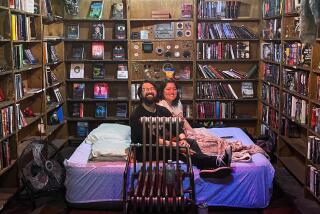Bed-Reading Problem Just Can’t Be Put to Rest
- Share via
My wife and I are dedicated readers in bed. I cannot recall a night when we did not fall asleep over our books.
You’d think this literary togetherness would produce a placidly happy marriage. Oh, the union is happy enough. It’s the placidity that suffers, and the cause of our unrest is reading in bed.
More than a decade of marriage has produced only an uneasy truce in this department.
The chief problem is bedside lights. My light doesn’t bother me. It’s her light that does. I switch off my light when I grow too sleepy to read. The problem is she isn’t sleepy when I am. She keeps right on reading and that pesky light of hers interferes with my slumber.
What’s worse, when she comes to a funny passage, the bed shakes with suppressed giggles. If she thinks it’s really funny, then she cannot resist reading it aloud to me, just as I’m drifting off.
If that isn’t grounds for mayhem, I don’t know what is. Fortunately, for her, I’m too sleepy to do anything but growl.
Another problem is our differences in reading-in-bed tastes. She usually reads murder mysteries, or other thud-and-blunder tales. They’re more stimulating than the kind of stuff I read, usually of a how-to-do-it nature or the history of magic. My kind of reading puts me to sleep quicker than her kind.
Once she urged me to read her kind. It was Stephen King’s “Pet Sematary.” That scary best seller kept me up reading far into the night, long after she’d fallen into fitful slumber.
After all these years of complaining about her light disturbing my sleep, you’d think she would have had the decency to refrain from complaining about my light disturbing her. She didn’t.
“Pet Sematary” frightened me so much, I couldn’t get to sleep after my light was off. She said my tossing and turning kept her awake.
I wasn’t tossing and turning. I was propping myself up in bed so I could hear better the ghouls I imagined were creeping up on me. After I finished reading that King novel, I was so exhausted from lack of sleep that I fell asleep for two nights after reading the same paragraph in my kind of book, and slept soundly, despite her darn old light. I notice she hasn’t recommended her kind of books to me since. She’s the kind of woman who has to have the last light on.
Right now, she’s reading “19 Purchase Street,” a pulp thriller by Gerald A. Browne. She lugs these old paperbacks home from the Newport Beach Friends of the Library book sale committee, where she volunteers her time sorting and marking donated books, reads them and returns them. I wish she’d elevate her literary tastes to duller and more edifying subjects. Then maybe we might coordinate our bed-reading habits.
I’ve been reading “Writeful” by Gary Hoffman, an English professor at Orange Coast College. It’s keeping me awake a wee bit longer than my average kind of reading, but still not long enough to switch off my light after hers. Published by Verve Press of Huntington Beach, “Writeful” is a textbook for writers. I’m finding it to be the most lively and useful book on learning how to write I’ve ever read. Here, for instance, is the part I fell asleep over the other night. Hoffman is writing of the use of jargon, official labels and buzz words. Of these, he says:
“Instead of making language more lively or reality more accurate, jargon sterilizes life by simplifying it, protecting the reader from something complex that deserves more thought or explanation. A writer who becomes fascinated with jargon wears a metal mask, cutting himself off from the reader and cutting the reader off from reality.”
Jargon “can hide reality from government budget committees or private assistance groups that could help change the people’s living conditions.”
Now, there’s an idea I might apply to my own problem. I might feel less disturbed by hiding reality under some mild jargon, such as, my dear wife is simply mitigating my slumber with a little gentle illumination.
More to Read
Sign up for our Book Club newsletter
Get the latest news, events and more from the Los Angeles Times Book Club, and help us get L.A. reading and talking.
You may occasionally receive promotional content from the Los Angeles Times.








